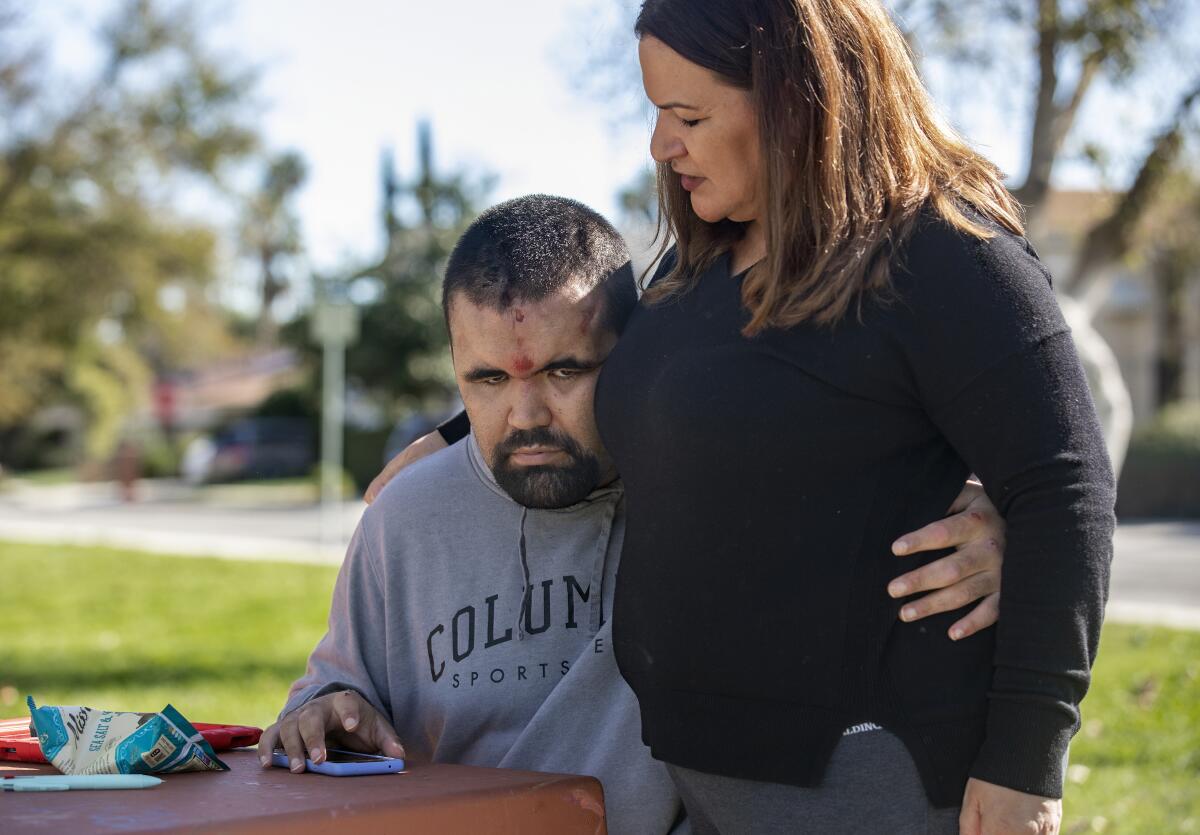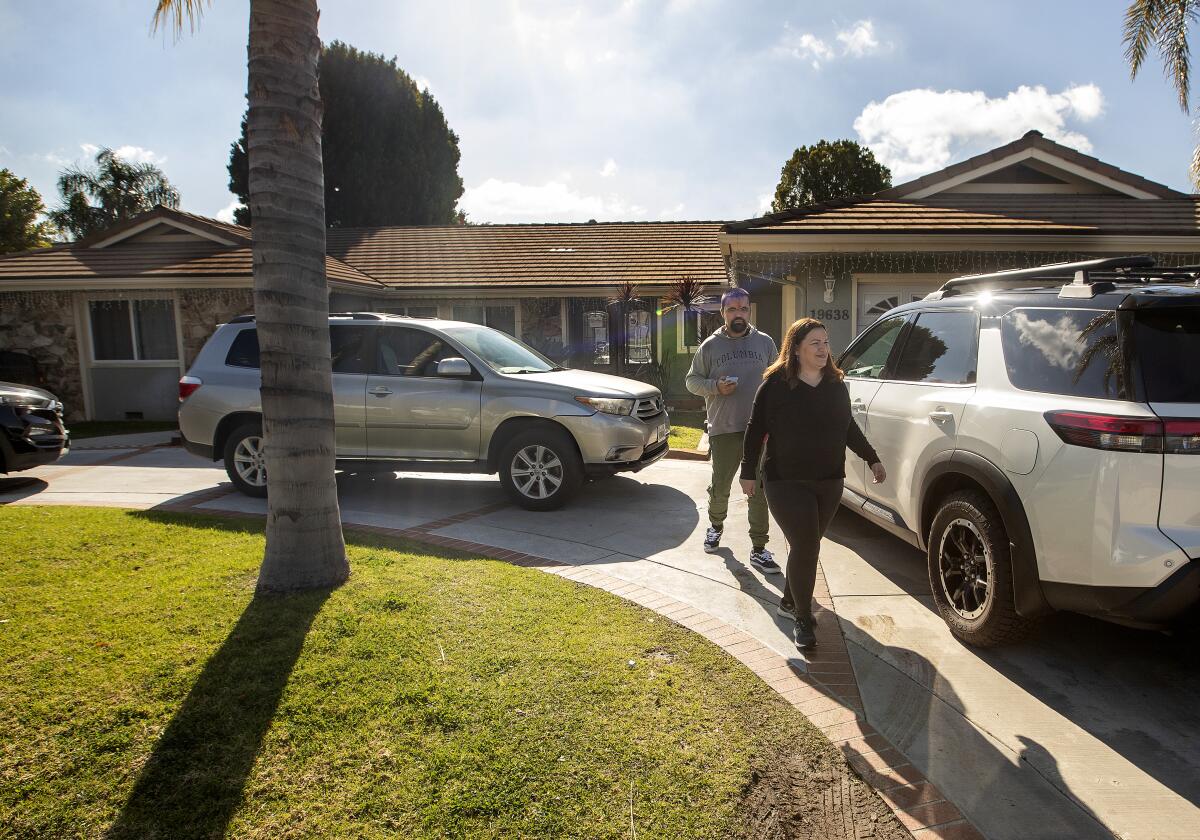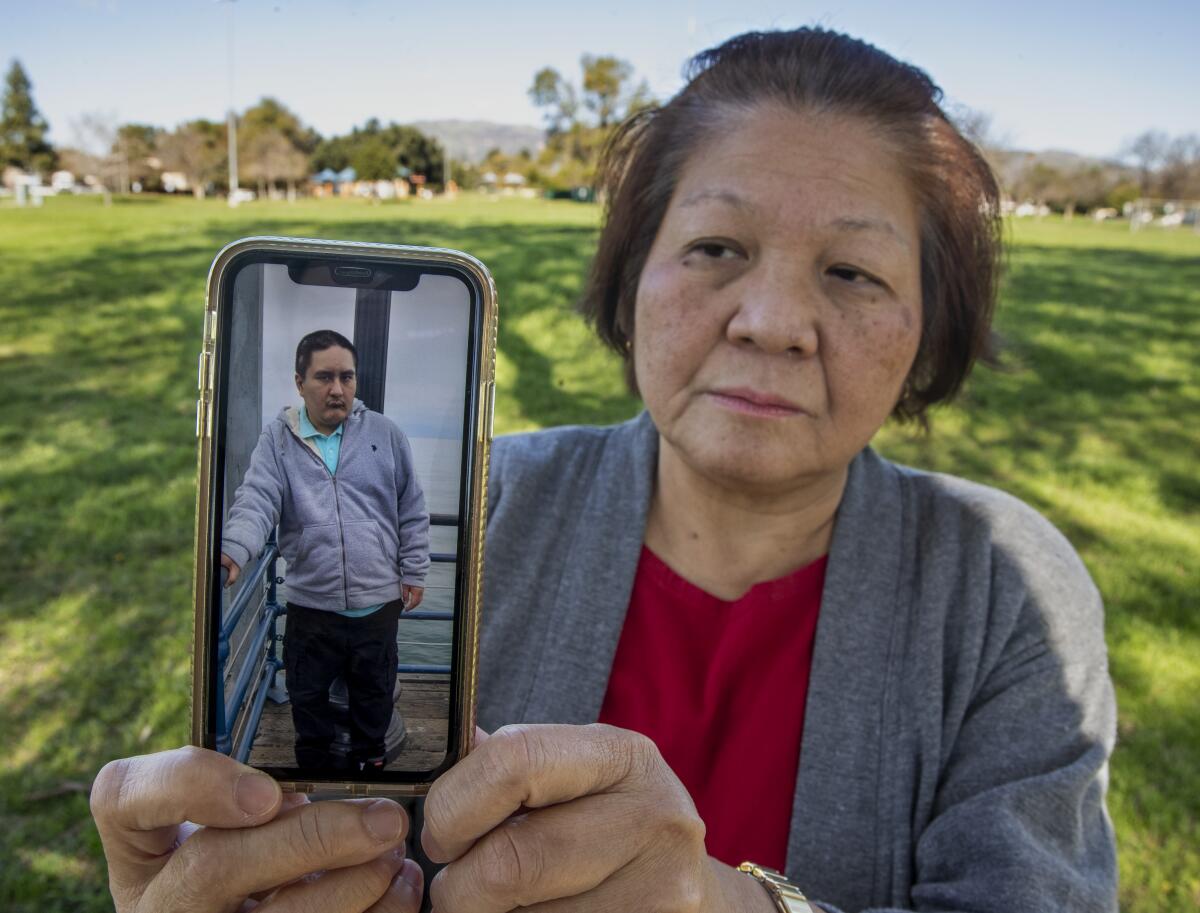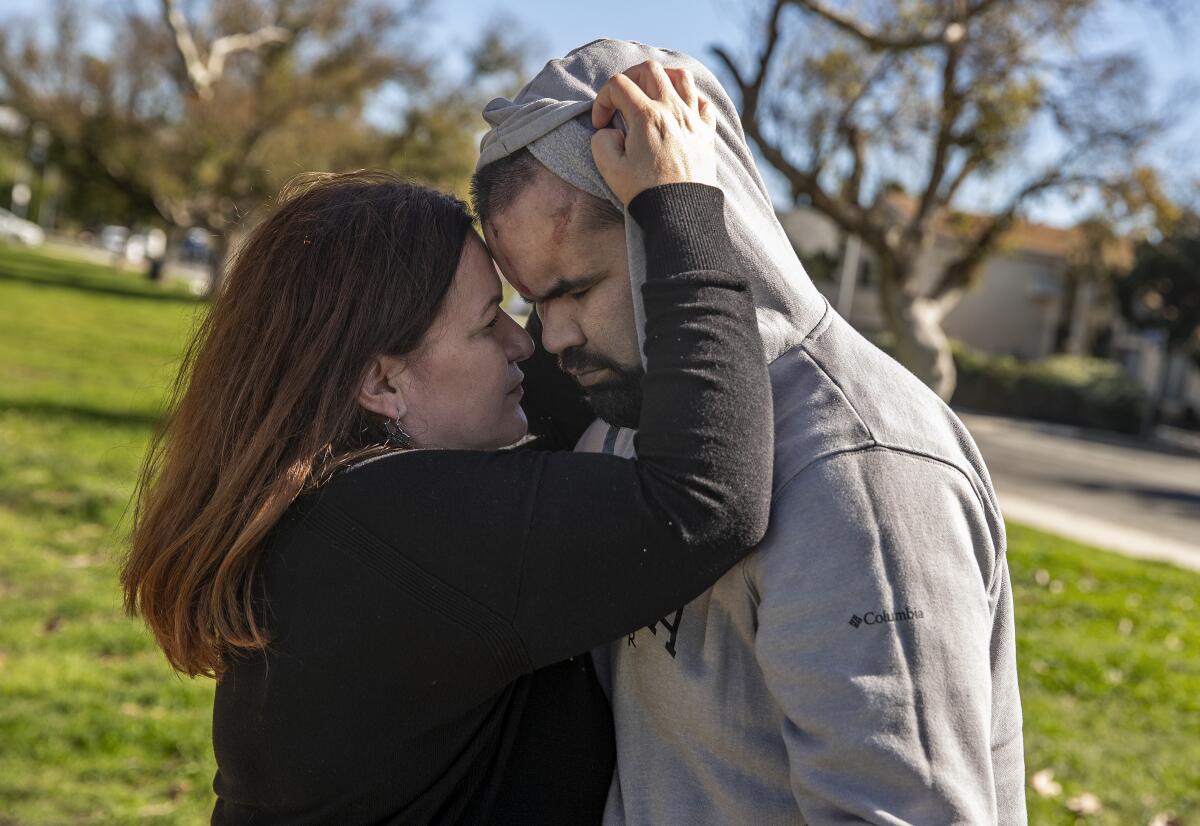Adults with autism faced ‘torture’ at this L.A. group home. Their moms want justice

The two caregivers edged toward the staff bathroom as the sounds of slaps and screams ricocheted across the ranch-style home.
The evening of Aug. 25, 2023, had already been an exceptionally trying one for staff at Elwyn-Mayall, a four-person home in Northridge for adults with developmental disabilities. Jude Cabanete, one of the home’s residents with autism, had spread feces across his mattress and vomited on the floor, according to staff reports from that night. The caregivers had hosed down the sheets. Cabanete seemed to want to get clean, too.
“Shower, shower,” said Cabanete, 31.
Adekunle Fabunmi, who was assigned to watch him that evening, told him no, a co-worker would later tell an internal investigator. Cabanete ran for the staff bathroom, where he emptied a container of disinfectant wipes and began to chug water out of it, according to an incident report reviewed by The Times. Fabunmi followed.
By the time two other caregivers got to the bathroom, Fabunmi was striking Cabanete in the head — a scene captured on cellphone video taken by one of the caregivers. The 13-second video viewed by The Times captures four slaps to the face and one punch to his left ear. One more slap can be heard off-camera.
“No,” Cabanete groaned after each hit, cowering by the bathroom window with his arms pinned to his side. “No. No. No.”
Fabunmi, a 53-year-old employee known as “Pastor,” would continue to torment Cabanete throughout the home, additional footage showed. In the living room, he threw Cabanete, naked from the waist down, from the couch onto the ground as he screamed. In the room next door, he ordered Cabanete, still wearing only a bright red T-shirt, to do 400 jumping jacks as he cried out to stop.
The videos do not show either of his colleagues intervening.
Fabunmi declined to discuss the case in a brief phone call and referred a reporter to his attorney. Christian Oronsaye, the attorney who represented him in a state investigation into the incident, provided The Times a letter he’d sent to the state saying he believed the accusations of abuse at the Northridge facility were false after interviewing Fabunmi, but declined further comment.
*
As California looks to move people with developmental disabilities from institution-style facilities and into smaller, more intimate homes, Elwyn has become a lifeline for the state, where officials say such homes are in critically short supply.
The 170-year-old nonprofit, which describes itself as a “premier, internationally recognized” provider for people with developmental disabilities, operates nearly 50 licensed homes in California for adults who can’t live alone. That’s more than nearly any other organization, state data show.

The violence captured on video at the Northridge home has raised questions about Elwyn’s prominent role as caregiver for some of the most vulnerable Californians — and whether oversight bodies are prepared to keep troubled homes in check amid a severe shortage in beds.
On Aug. 25, the same night Fabunmi hit and punched Cabanete, he forced another resident of the home, 30-year-old Gregorio Topete, to sit on the living room floor for three hours, a co-worker later told police. Fabunmi stood over Topete “in an intimidating manner” when he tried to move, slapping him twice on the head, according to a Los Angeles police detective’s case log. Topete stayed on the ground until 2 a.m.
Fabunmi would deny to his bosses hitting anyone that night. Within a week, he no longer worked for Elwyn, according to the nonprofit.
The LAPD submitted the case in late October for the Los Angeles city attorney’s office to consider misdemeanor battery charges. The case is pending.
Elwyn said in a statement that the health and safety of those it serves is of “paramount importance.”
“For over 20 years, Elwyn has supported this mission in California very effectively and with a high level of satisfaction from both supported persons and their loved ones,” Elwyn said, adding that the nonprofit’s track record was “exemplary.”
“The allegations ... are isolated to a particular set of circumstances, and do not represent Elwyn’s long-standing activities in California.”
*
Fabunmi’s colleagues had accused him of assaulting a man he was paid to protect once before.

In the spring of 2019, Fabunmi was working as a caregiver for both Elwyn and People Creating Success, a company that serves people with developmental disabilities.
That June, a manager at People Creating Success called the LAPD after a staffer said she saw Fabunmi slap a nonverbal man with cerebral palsy at its group home in West Hills, according to a police report. The staffer told police Fabunmi had grown frustrated trying to put a shirt on the trembling 55-year-old, telling her he was “the most difficult to work with.” People Creating Success terminated him within two weeks of the incident, according to the report.
Fabunmi would later sue the company, arguing that staff “made up” the accusation to get rid of him. The attorney who represented the company said the case was resolved through a confidential settlement.
After investigating, the LAPD referred a case of misdemeanor battery to the city attorney’s office. Frank Mateljan, an official with the office, said the matter was “resolved outside of court” through a city attorney hearing, a way to settle low-level crimes without a criminal prosecution.
Typically in these hearings, the perpetrator is provided “guidance as to how to avoid violating” the law, he said. No criminal charges were filed.
People Creating Success reported the alleged abuse to the California Department of Social Services, which licenses the home, according to a state report. After an internal investigation, the company banned Fabunmi from going near the home. The state agency told The Times it investigated the claim as well but did not find enough evidence to warrant banning him from other licensed homes.
This meant he could keep working at a cluster of Elwyn homes just a few miles from where he was fired. Elwyn said it was never notified about the investigation or the criminal case by the Department of Social Services, which had received a report on the alleged abuse.
Advocates say the incident has exposed failure at every level in a system built to hold abusers accountable.
“When a licensing authority lets someone who is credibly accused of abusing a vulnerable person have a chance to go back and do that again rather than stripping their license, it’s absolutely a system failure,” said Larkin Taylor-Parker, legal director of the Autistic Self Advocacy Network, a national public policy nonprofit run by autistic people.
On Aug. 27, the employee who video-recorded the incident two days earlier sent the footage to a colleague who worked at a group home in Agua Dulce. The woman would later tell an Elwyn investigator that she “did not feel safe” reporting the assault to her direct boss.
“All the males in the home, when they get close to residents, the residents flinched,” she told him. “Jude flinched.”
By Aug. 30, staff at the North Los Angeles County Regional Center had seen the videos. The government-funded nonprofit, which provides services for people with developmental disabilities in the northern part of the county, currently contracts with Elwyn for eight homes, including the Northridge location. One more is under development in the Antelope Valley.
“It is violent and horrible to watch,” Ari Stark, a quality assurance specialist at the regional center, wrote to two colleagues, according to a transcript of instant messages reviewed by The Times.
Stark, who was responsible for monitoring Elwyn-Mayall, wrote in emails to his colleagues that he was concerned about “a lack of oversight from ‘management’” at Elwyn, which “has obviously lead to this situation where someone physically assaults a client and staff sit by.”
“I am super concerned with Elwyn’s ability to provide a safe and appropriate environment to any of their consumers,” Stark wrote in an email to a supervisor. “If it were up to me, I would terminate their contract once we found a better provider.”
“I don’t believe their clients are safe with them,” he wrote. “Just needed to share that opinion with you.”
On Jan. 9, Elwyn reported that Cabanete had once again been a victim of suspected psychological abuse.
According to a report from an Elwyn specialist inspecting the Northridge home that afternoon, a staffer had again ordered Cabanete, who is about 5 feet 10 and 240 pounds, to do 100 jumping jacks — twice.
When the staff approached, Cabanete would still flinch.
*
Cabanete was about 12 when his mother realized he was no longer safe at home. He would get frustrated when he couldn’t communicate, banging his head until it swelled up.
As a teenager, Cabanete moved to the Fairview Developmental Center, a state facility in Orange County for people with developmental disabilities, many of whom required round-the-clock care. He stayed there until 2016, when officials finalized a plan to shutter Fairview, concerned that developmental centers isolated people with disabilities from their communities. He spent six years at a home near Culver City before arriving at Elwyn-Mayall in April 2022.
His mother said the home seemed “family friendly,” located on Mayall Street in the northwest San Fernando Valley. She could drive there every afternoon from her home in North Hills and drop off his favorite meals: KFC, El Pollo Loco and homemade chop suey. Caregivers would take him on excursions to the Santa Monica Pier.
“It was sold beautifully,” agreed Laura Topete, whose son, Gregorio, moved there nine years ago.
The home had a good sales pitch for desperate parents: A stay with no end date. A nurse on site 24/7. Caregivers never out of their sons’ sight.
Elwyn would get paid extra for this.
Since landmark legislation passed nearly half a century ago, California is required to ensure that all residents with developmental disabilities get the services they need. To that end, hundreds of millions of dollars flow each year from the California Department of Developmental Services to the state’s 21 nonprofit regional centers.
The centers pay more to providers that house people with more intensive needs, such as Cabanete and Topete. Whereas the north county center would pay about $1,400 per month for a person at the lowest-level home, Elwyn got roughly $20,000 a month for Cabanete last year, according to regional center records provided by his mother.
But Mary Cabanete and Laura Topete say the heftier price tag never translated into better care.
Instead, the two mothers said they found staff ill-equipped for the most fundamental part of the job: keeping their sons safe.
The mothers said they would find bruises the staff couldn’t explain — even though the home was required to have a caregiver, sometimes two, near the men at all times. Twice, the home called police after Topete started hurting himself, his mother said. Cabanete once escaped into a busy intersection after “terrible explosive behavior,” according to an incident report.
The tensions between the mothers and the staff had been building. Then in early September, about two weeks after Fabunmi slapped and punched her son, Mary said she got a call from Elwyn as she was dropping off lunch at the home. She was told the home was “investigating an allegation of abuse.”
It was another week before she got the details.
“It was torture,” said Mary, who read Elwyn’s report detailing the abuse but has not watched the videos herself.
Both women, represented by personal injury attorney Craig Charles, have sued Fabunmi and Elwyn as well as the North Los Angeles County Regional Center. The mothers allege their sons were “assaulted and battered” by Fabunmi while the other two staffers, both required by law to report abuse, failed to intervene. Elwyn said in a statement that it is not able to comment on pending lawsuits but that mistreatment of residents “is not tolerated.”
“I’m actually really grateful that somebody recorded it — because both of our sons are not good historians,” Laura Topete said. “They would have gotten away with it.”
Linda Carter, 65, found herself in a similar position five years ago: convinced her son with autism had been abused at an Elwyn facility. Only she didn’t have video.
With Fairview closing, her son, Brandon Newman, was moved to an Elwyn home in West Covina in October 2017. Carter said it became clear the workers at the home were not prepared to be the 24/7 caregiver for her son, an attention-loving 40-year-old who lives for rides in the back seat of his mother’s car.
She said his leg swelled up with cellulitis. She took photos of a hematoma on his eye that went untreated for so long his socket bulged to the size of a golf ball. Another time, she said, she found her son lying in sheets soaked in urine.
Carter began to suspect the injuries weren’t just from neglect. In October 2018, the West Covina Police Department got a pay phone call from a woman at an Arco gas station alleging Elwyn employees were abusing a man matching Newman’s description — a Black man with a disability. A few months later, someone sent an anonymous letter to Elwyn’s leaders alleging that three staff members, referred to as “monsters,” would grab Newman by the testicles and “sock” him in the head.
“I pray to Jesus that one day the abuse don’t go to far and kill a client,” the person wrote.
The physical abuse was never proved. Staff members insisted the bruises he had were self-injuries, his mother said. Newman, whose speech is limited to two- or three-word sentences, couldn’t say either way.
“Brandon is helpless. They’re going to hurt him and say he did it?” Carter said. “No, they messed with the wrong child.”
In June 2019, she sued Elwyn and the San Gabriel Pomona Regional Center, which placed him in the home, calling it a “last resort” to stop the abuse of her son. The lawsuit was settled for $75,000, according to court records.
Elwyn said in a statement that there was “no determination of liability” against the organization and called the allegations “speculative and uncorroborated.”
Carter later quit her job at a military base to care for Newman full time.
*
In California, an alphabet soup of bureaucracies is tasked with making sure people with developmental disabilities are not abused — and if they are, making sure those responsible are held accountable.
But advocates say the oversight system has broken down in California, allowing problem homes to stay in business and abusers to circulate through them.
The California Department of Social Services, which licenses group homes, often takes the lead on big investigations and can permanently bar employees from all homes if it finds enough evidence that abuse occurred. But advocates say complaints of abuse are rarely proved, making it easy for problematic staff, like Fabunmi, to drift from one home to another.
“The state doesn’t have enough investigators to do the sort of due diligence that’s required to understand what really happened,” said Jody Moore, a lawyer who represented Carter and specializes in cases of abuse in nursing and group homes.
The department said in a statement that staff investigate all complaints that suggest a threat to residents in licensed homes, and take “appropriate disciplinary action, in accordance with state law.”
Experts say allegations of abuse of people with autism who require significant support can be particularly difficult to prove. Some victims may harm themselves, making it easy for an abuser to brush off injuries as self-inflicted, or may struggle to communicate what happened. For example, Cabanete told investigators twice he was not hit, despite it being clearly captured on video.
In the last five years, the state has investigated 25 complaints alleging adults in Elwyn homes were injured or physically mishandled, according to publicly available investigation reports from the state’s licensing division. All but three were not substantiated.
The regional centers, meanwhile, have the power to impose sanctions on problem homes, including pulling their contract. But advocates say they rarely do, instead encouraging families to move their loved one out of the home — a “sanction” that families say is useless when there’s nowhere to go. On Nov. 2, the north county regional center sent Elwyn-Mayall a letter that cited state regulations, saying they would recommend relocation and “discuss the consequences of refusing to relocate” with families immediately. Nobody moved.
Former and current staff at regional centers say there’s little appetite for cracking down hard on providers when there’s a shortage of beds, particularly for those who need the most intensive support. It leaves staff with an essential question: How bad does the care have to be before it is worse than nothing?
“I’ve heard of vendor programs where the [inspectors] went in and the place is infested with bedbugs, the sheets haven’t clearly been changed in months, and they really are faced with a tough choice,” said a former longtime regional center staffer who spoke on the condition of anonymity to discuss her past employer. “They know there’s no open beds. So what do they do?”
Cristina Preuss, the head of the North Los Angeles County Regional Center, which placed Cabanete and Topete in Elwyn-Mayall, said in an email to The Times that it was “inaccurate and incorrect” to say the shortage of beds made regional centers reluctant to shutter homes.
State regulations allow residents to stay in a facility as improvements are made, she said, as long as they’re not in “immediate danger,” avoiding upending their lives.
“The residents may have close relationships with their housemates and not be able to live with them ever again if the home closes. The residents may also have long and important relationships with staff,” she said. “Those relationships are severed when the residents move.”
Lawsuits bring little incentive for regional centers to find better placements, advocates say, as a California court ruling makes it exceptionally difficult for families to hold the centers liable for placing their family member at a home where they were abused.
The north county regional center has argued that it has no liability for the Aug. 25 incident. Attorney Daniel Friedenthal, who represents the center in the Cabanete and Topete lawsuits, pointed to a state Supreme Court ruling that found a regional center was not responsible for the death of a diabetic man whose nurse forgot his insulin. Centers couldn’t realistically be expected to do day-to-day monitoring of the homes where they place people, the court ruled.
“The reality is it’s like you go to a medical clinic and then you get referred out to a specialist or you get referred out to a dentist or whatever you need,” he said. “That’s kind of what a regional center does.”
Attorneys who represent victims of abuse say it’s created a “legal nightmare.”
“I’ve never been able to find a way to sue the regional center despite seeing this chronic — I mean chronic — problem,” said attorney Kim Valentine, who specializes in cases involving abuse of elders and dependent adults. “There’s no accountability.”
*
On a sunny late-January day, Laura Topete visited her son at the Northridge home and found him with a bright red welt in the middle of his forehead. He had been hitting his head again.
Experts say abuse can have a particularly devastating effect on people with autism, potentially leading to outbursts and developmental regression.

Five months after the August incident captured on video, Mary Cabanete said her son is doing alright, though he still flinches when she goes to rub his head.
But Topete — whose caregiver told police he was slapped and forced for hours to sit on the floor — has “fallen apart,” his mother said.
For years, he’d hurt himself only sparingly. He was easygoing with a travel bug, she says, enthralled by trips to Disneyland and San Francisco. He keeps a storage container brimming with brochures from California’s welcome centers.
Since the incident, she said, it’s been a barrage of injuries. As of December, he hurt himself an average of 101 times per month, according to a report from his behavior analyst. Earlier in the year, he was averaging three.
She says she’s become accustomed to him looking “like an MMA fighter who lost.”
They drive to Trader Joe’s, where he picks up some edible cookie dough, then head to his favorite table at the pocket park next-door to eat. She and her husband have to redirect his attention every few minutes to stop him from harming himself.
“We’re gonna be good, right?” Laura Topete tells her son, teasing the Disneyland trip they have planned.
For months, she’s been looking for another home. But she keeps being told there’s nothing available.
Like Carter, she’s considering quitting her job as a nurse to care for him full-time.
“I’m getting him out of there,” she said.
More to Read
Sign up for Essential California
The most important California stories and recommendations in your inbox every morning.
You may occasionally receive promotional content from the Los Angeles Times.











